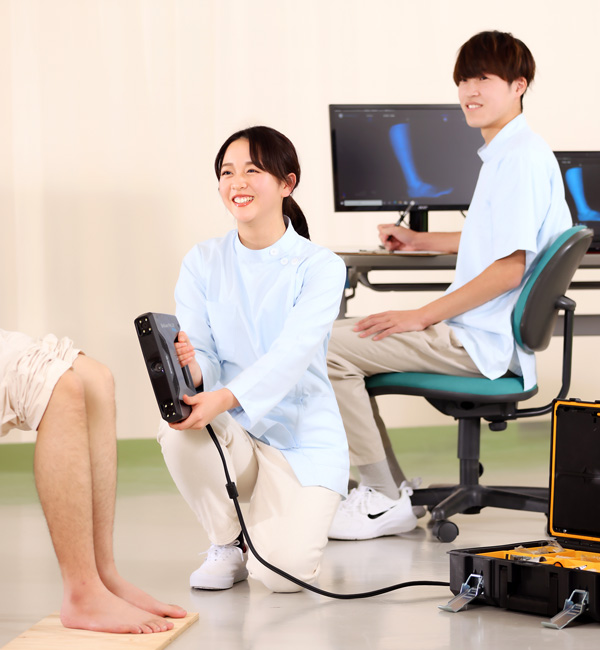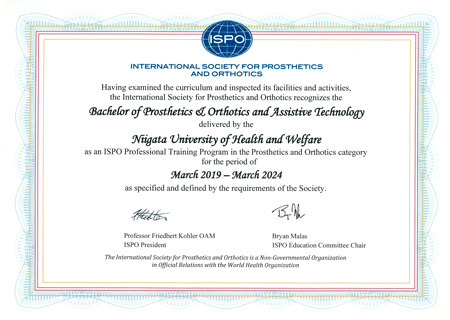
Objectives
The number of elderly people in Japan is growing rapidly. Therefore, to maintain and improve their quality of life (QOL) is the most urgent issue for our society. For this purpose, we need quite a number of health care professionals who know much about assistive devices, who are able to evaluate the capabilities of physically disadvantaged people, and who can communicate effectively with their families and other professionals. The objective of our department is to help the students become such health care professionals.
Characteristics of the Curriculum
 As required by the Ministry of Health, Labor and Welfare, our departmental curriculum contains all the specific educational subjects related to medicine, engineering and prosthetics & orthotics. In addition, our curriculum includes subjects covering liberal arts, and health and welfare.
As required by the Ministry of Health, Labor and Welfare, our departmental curriculum contains all the specific educational subjects related to medicine, engineering and prosthetics & orthotics. In addition, our curriculum includes subjects covering liberal arts, and health and welfare.
This department has been certified to be in "ISPO Category I", which is the highest standard of educational institutions for training prosthetists and orthotists by the International Society of Prosthetics and Orthotics (ISPO). This is the first certification awarded to a Japanese university.
Qualifications and Careers
Our students aim to qualify to take the national examination for certified prosthetists and orthotists, and Assistive Products Consultants, Assistive Products Planner, and Housing Environment Coordinator for Elderly and Disabled People. By doing so, our graduates have received many job offers from a wide range of welfare facilities, such as welfare centers, assistive care centers, hospitals, rehabilitation centers, car industries, house industries, and so on.
International Activities
We have some international programs of short-term visits to foreign countries, where we visit several universities, welfare facilities, and manufactures, including the largest companies in the P&O field. We also promote research cooperation with the Sirindhorn National Medical Rehabilitation Centre (SNMRC) in Thailand on motion analysis and National Taipei Veterans General Hospital in Taiwan on prosthetics and orthotics.
Diploma, Curriculum and Admission Policies (Department of Prosthetics & Orthotics and Assistive Technology)
| STEPS Abilities and attitudes of qualified QOL supporters |
Diploma Policy NUHW grants a bachelor's degree to the students who have acquired the following abilities and attributes. |
Curriculum Policy NUHW implements the curriculum as follows in order to help students develop into competent QOL supporters. |
Admission Policy NUHW seeks students who have the following abilities and attributes. |
|
|---|---|---|---|---|
| S | Science & Art Ability to utilize scientific knowledge and skills in academic discipline |
Abilities to utilize their advanced scientific knowledge and skills in prosthetics and orthotics and assistive technology | In the first year, the basic subjects for objectively analyzing the prostheses, orthoses, and welfare products are arranged. For the second and third year, the subjects to learn about the objective analytical methods for people are arranged. In the fourth year, as the completion, graduation research project is arranged. The outcome is evaluated based on achievement of the relevant subjects and the national examination pass rate. | Basic academic knowledge of subjects on the entrance examination such as English, Japanese, Mathematics, Physics and Biology, equivalent to high school graduation |
| T | Teamwork & Leadership Ability to work together as a team and to show leadership qualities |
Abilities to demonstrate leadership for solving clients' problems in interprofessional collaborative practices | In the first grade, the basic seminars are arranged in the department alone. In the second grade, the inter-professional basic seminar including students from all departments is arranged. In the fourth grade, as the completion, general inter-professional seminar and clinical internship are arranged. The outcome is evaluated according to the achievement of the relevant subjects and clinical internship. | Abilities to appropriately express one's thought and being able to convey it to others |
| E | Empowerment Ability to support clients by giving them powers to promote QOL |
Attitude to strive for the QOL of clients with respect and support for their diverse backgrounds | From the second grade, the practical subjects based on actual patients are arranged. In the fourth grade, subjects of specific cases are arranged. The outcome is evaluated based on the achievement of the relevant course and the national examination pass rate. | A helpful attitude toward a person in need |
| P | Problem-solving Ability to find ways of solving problems and propose better solutions |
Abilities to identify problems and provide better solutions for clients as specialists in their interprofessional collaborative teams | From the second year, the subjects of manufacturing based on actual subjects are arranged. In the third year, we arrange the subjects in which students objectively analyze human walking. Also, clinical internship is arranged and graduation research is arranged in the fourth year. The outcome is evaluated from the results of the clinical internship and the national examination pass rate. | Abilities to think logically toward a reasonable judgment on a phenomenon |
| S | Self-actualization Attitude towards the fulfillment of his/her potential |
Attitude to maintain interests in advanced technology and a wide variety of social issues to contribute as part of their lifelong learning in prosthetics, orthotics, and assistive technology | In the first year, subjects to learn the significance of QOL are arranged. In the second year, the practical training tours are held. In the third and forth year, the clinical internships are arranged to learn from the user and occupations such as prosthetists and orthotists. Also, international exchange programs are arranged. The outcome is evaluated based on the performance of the relevant subject and the status of qualification acquired at the international level. | Strong interests and high motivation to learn actively about prosthetics and orthotics, assistive products and devices |
| Remarks | Refer to University Regulations, Article 1 | Refer to School Manual(Gakusei Binran) | Refer to Guidelines for Applicants(GakuseiBoshu Yohko) | |
| Degree to be awarded | Bachelor of Prosthetics & Orthotics and Assistive Technology | |||
Notes: "STEPS" is a acronym formed from the words, which represent "the five requirements" for qualified QOL supporters.
NUHW stands for Niigata University of Health and Welfare.

